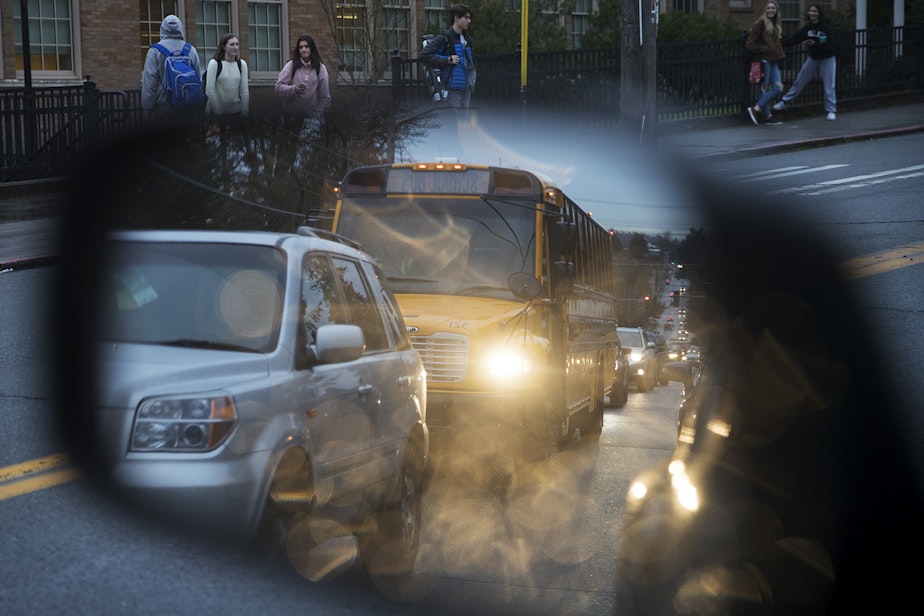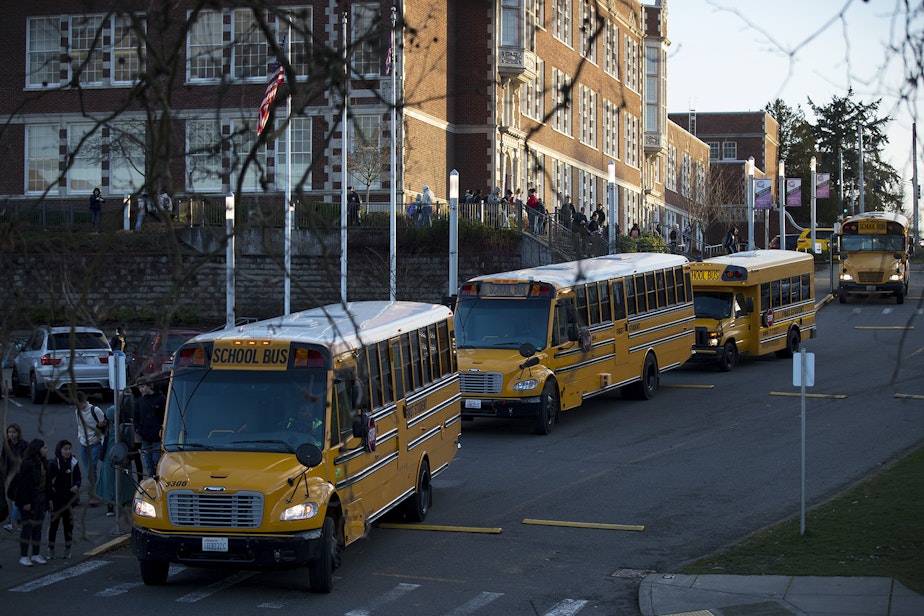When Seattle school buses run late, who picks up the extra cost?

F
orty-seven school buses.
That’s how many were running at least an hour late to and from Seattle Public Schools on a crisp Friday in October.
Little surprise to the hundreds of kids waiting: Buses had been running behind since the first day of school, sometimes by two hours.
First Student, the company that sends out most Seattle school buses, blamed driver shortages. Many had quit since a drivers’ strike last February, and hiring replacements had been tough.
The school bus company, North America’s largest, was supposed to compensate Seattle Public Schools for the service problems, according to its contract with the district. But First Student kept sending the usual invoices, and Seattle schools officials kept paying them … all the while shelling out hundreds of thousands of dollars for back-up buses, taxis, and Metro bus passes.
Now, halfway through the year, a KUOW analysis shows that First Student owes the district an estimated $3.3 million … with no indication that the district will recoup anywhere near that amount.
School district spokesman Tim Robinson issued a written statement:
“As good stewards of public funds and in an effort to get students to and from school, we continue to work closely with our contracted vendor, First Student, to improve performance.
Sponsored
“Seattle Public Schools takes its fiscal steward responsibilities seriously. Please know that due to ongoing negotiations and legal claims raised by both First Student and Seattle Public Schools, we cannot provide more detail at this time.”
But by all accounts, the district has little negotiating power: First Student was the sole bidder on the contract.
“The district is in a tenuous position when the contract is up next year,” said Shannon McMinimee, former attorney for Seattle Public Schools. “They could be worried that they will have no bidders next year if they are aggressive now.”
S
hawna Murphy is a south Seattle mom with two kids in the district. Both receive special education services.
Sponsored
“My third-grader’s special ed bus was late over 20 times in November and December,” Murphy said. Her daughter suffers from transportation anxiety, Murphy said, so getting to school even five minutes late upsets her.
“When her bus is late arriving after school, that means that the school has to provide staffing in accordance with the special ratios for the children in the group," Murphy said. Two district employees had to work overtime to wait with children for their buses.
And once, someone from the district drove her daughter home because her bus route didn’t have a driver that day.
The school district has a three-year contract with First Student, and pays the company $30 million a year. The contract requires the bus company to pay for late and missed routes, and the cost of paying for back-up buses.
But the district has not enforced this requirement, and instead has shouldered the financial burden for First Student’s failure to run buses on time.
Sponsored
That includes pricey back-up charter buses that drive up from Pierce County, taxis, mileage reimbursement for parents, school staff staying late to supervise kids whose buses haven’t come, and make-up tutoring for special education students who have missed class.
Murphy said she was “shocked” to hear that First Student hasn’t paid for these bus problems.
“Why aren’t they fining First Student for these breaches of contract? They have to spend their money more wisely,” she said, especially given the district’s projected budget gap next year.

A
s is standard in school transportation contracts, First Student is required to adjust its charges to the district for any late routes, defined as between 11 and 30 minutes behind schedule. Missed trips, known as “blown” routes, are supposed to be deducted in full from each invoice.
If routes more than 30 minutes late qualify as blown routes, as the contract implies, First Student would owe the district nearly $16,000 in deductions for that one October day.
The district would not tell KUOW how many late or blown routes it has tallied this school year, citing negotiations with the contractor. But KUOW calculations, based on the bus delays listed daily on the district’s website, suggest First Student may owe the district more than $860,000 in billing adjustments.
Three months of billing records between the district and First Student, which KUOW obtained through a public records request, show that the district has not deducted payments for late or “blown” routes as outlined in the contract.
Sponsored
Making sure that invoices are adjusted before being paid isn't just good accounting practice – it’s a legal requirement of government agencies in Washington state.
“As stewards of public dollars, school districts are specifically required to account for their spending,” said McMinimee, the former school district attorney. “When they get an invoice or a bill, they are supposed to audit it before paying to make sure they don’t overpay.”
If the district paid for routes that First Student failed to run as promised, that could be a violation of state law, which requires that agencies certify that services have been rendered, and “labor performed as described,” before paying contractor invoices.
“The district has a limited pot of money, and is entrusted by the state and the taxpayers to effectively use that money and make sure they don’t overspend when they don’t have to,” McMinimee said. “And this particular instance is a great example of that.”
F
irst Student’s potential financial responsibilities to the district do not end there.
Since October, the district has contracted with two other providers to run some of the dysfunctional First Student routes, including $1.65 million in contracts with Durham School Services for 15 additional yellow buses and drivers.
Those extra buses come at a high cost. Durham charges around 50 percent more per route than First Student: $483 per one-way route, compared to $324. That’s at least partly because the buses are coming all the way from a bus yard in Lakewood, 75 minutes south of Seattle.
According to the district’s contract, those extra costs are the responsibility of First Student. Billing records from November show that First Student removed its 15 canceled routes from the invoice. But the district picked up the tab for the additional cost for the Durham buses.
Seattle Public Schools has said that it also hired additional special education buses and drivers from American Logistics Company to make up for unavailable First Student buses, but would not disclose the cost of those buses to KUOW.
First Student, a subsidiary of Scotland-based FirstGroup, did not respond to multiple requests for an interview.
T
he largest sum First Student owes the district, according to the contract, is in another category: damages.
A liquidated damages clause in the contract is meant to recover intangible losses to students, families and school staff due to transportation problems - things like the cost of making up missed class time, and extra burden on families and school staff. The contract stipulates damages of $200 for each route that runs at least 15 minutes late, $800 for blown routes, and $100 per route without a regular driver.
By KUOW’s calculations, liquidated damage claims could total nearly $2.5 million since the start of the school year.
Asked whether the district has assessed damages as laid out in the contract, spokesman Tim Robinson provided a second written statement:
“Our focus continues to be on working with First Student to improve on-time performance and recruitment of new bus drivers. We track missed and late bus routes and will be addressing potential liquidated damages with First Student in the future.”
G
iven these breaches of contract, why hasn’t the district aggressively pursued compensation from First Student?
A similar busing crisis in Montana, in Bozeman Public Schools, illustrates the risk to districts that try to enforce their contracts with First Student. That district also had buses running way behind last fall due to a driver shortage.
“We had non-operational routes every day from the beginning of school all the way through November 30,” said Mike Waterman, the district’s business services director: 542 late, combined, missed, or improperly-staffed buses in the first three months of school, by the district’s count.
Waterman said First Student billed as usual. But he treats invoices from the transportation giant “as sort of a starting place,” he said. “If there's a non-operational route, first of all, the contractor doesn't get paid for that route,” Waterman said. “In addition, there is a $1,000 liquidated damage charge assessed for it.”
That’s where things got tricky.
By the end of November, First Student had racked up more than half a million dollars in damages, according to Waterman. But the company challenged the amount of that assessment and refused to pay, he said.
First Student then told the district that it would cancel the contract as of May, Waterman said, leaving the district with no bus service for the last month of school.
The conflict was frustrating, Waterman said, because the district had put the liquidated damages clause in the contract hoping that it would never be needed, and would merely incentivize full staffing. “We weren't looking for their money. We just wanted the service that was promised and expected. We want our students to get to school on time safely.”
The Bozeman School Board approved a settlement with First Student last week that reduced the amount of damages the company must pay to $149,500, in exchange for guaranteed bus service for the remainder of the contract.
Seattle Public Schools has recovered liquidated damages from First Student in the past: district records show the company paid nearly $346,000 in damages due to service issues in the 2016-17 school year.
Steve Calandrillo, a professor of contract law at the University of Washington, said that despite what’s in a legally-binding contract, power imbalances can mean that one party can still come out ahead.
“People all the time are in this position of potentially revising their contract obligations, or letting slide part of the other side's obligations, if they think that will give them leverage in future negotiations, or if they think it's important to preserve that relationship,” Calandrillo said.
“That's a judgment call for the parties involved. Ultimately, if you're contracting for services, and you're not getting services, at some point you've got to step forward and enforce that contract.”




